人教新目标七年级英语下册Unit12原始语法精讲
人教版七年级下册第十二单元unit12重点短语语法句型
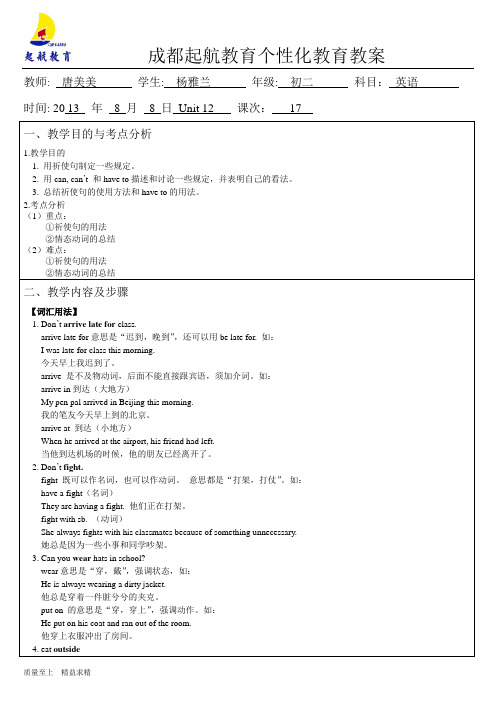
He has to be in bed by ten o’clock.
十点钟前他必须上床睡觉。
I had to leave early yesterday morning because I wasn’t feeling well.
昨天早上我感觉不舒服,所以我不得不早离开。
注:
A.have to的否定式是在have to前加上相应人称、数及时态的助动词否定式,如:don’t, doesn’t或didn’t,意为“不必”。如:
Open the door, please.
请打开门。
B. Be+表语(名词/形容词等)+其它成分
Be careful!
当心!
Be a good boy!
做个好孩子!
C. Let+宾语(通常为第一人称或第三人称宾格)+动词原形+其它成分
Let me tell you about it.
让我告诉你这件事。
否定句式:
D. Don’t +动词原形+其它成分
Don’t smoke in the room.
别在室内抽烟。
Don’t be late for school.
上学不要迟到。
E. No+名词或动名词。(这种否定多用于公共警示语)
No photos!
禁止拍照!
No fishing!
禁止钓鱼!
No parking!
教师:唐美美学生:杨雅兰年级:初二科目:英语
时间: 2013年8月8日Unit 12课次:17
一、教学目的与考点分析
1.教学目的
1.用祈使句制定一些规定。
2.用can, can’t和have to描述和讨论一些规定,并表明自己的看法。
Unit+12+讲义 人教版七年级英语下册

Unit 12 What did you do last weekend?1.---Who visited her grandmother?---Becky did.答语中did代替句中visited her grandmother.(英语中为了避免重复,经常用does、do、did等来代替前面的动词或相关内容,且时态与问句保持一致)Eg:---Who cooks dinner for you every day?---My father does.(代替cooks dinner)---Do you like watching TV?---Yes,I do.(代替like watching TV)2.I worked as a guide at the Natural History Museum.as:(prep)当作;作为(其后常接表示职业、用途等的名词) 若放在句首,则常用逗号与语句的主体隔开Eg:She works as a giude in a company.As a player, you should do more exercise.辨析:as&likeas: 用于说明同一关系,即两者实为一体like:用于说明相似关系,并不等同Eg:He works as a teacher.(言外之意:He is a teacher.)He works like a teacher.(言外之意:He isn’t a teacher.)3.I stayed up late to watch the soccer game.stay up:熬夜stay up late:睡得很晚与stay相关的常见短语:stay at home待在家里stay away from远离stay healthy保持健康stay out 待在外面与up相关的短语call up 打电话catch up with 赶上come up with提出get up 起床give up放弃grow up 成长look up 向上看;查出make up编造;构成pick up 捡起;中途载人put up 举起;张贴set up 创建show up出现take up 占据turn up调大use up用完;耗尽4.Father mouse shouted at the cat, “Woof,woof.”辨析:shout at &shout toShout at:冲...大声叫喊(多指因生气/愤怒冲某人叫喊)Eg: He loses his temper and shouts at me.shout to:对...大声叫喊(无恶意,多因距离远)Eg: : “Can you hear me?”he shouts to Tom.5.“Well,son,that’s why it’s important to learn a second language.”(1)that’s why...这就是...的原因why引导的名词性从句在句中作表语Eg:That’s why I can pass the important exam,because I study hard. that’s because...那是因为...(表示原因)Eg:He didn’t go to school trip. That’s because he was badly ill.6.flew a kite 放风筝flew为fly的过去式fly的用法:(vi)(1)fly to乘/坐飞机=go (to)...by plane/airEg:She will fly to New York. She will go to New York by plane/air.(2)飞Eg:He hopes he can fly like a bird.(3)飞逝Eg:How time flies! (时光飞逝)(4)苍蝇Eg:Look! A fly is swimming in the porridge.7.There we put up our tents and made a fire to keep us warm and cook food on.(1)put up:搭建;张贴(动副结构)(2)keep的用法Keep sb./sth.+adj 让某人/某物保持...(强调某种状态)Eg:The coat will keep you warm.The students should keep the classroom clean.Keep sb./sth.+doing 让某人/某物一直...(强调动作的持续性)Eg:I’m sorry I’ve kept you waiting.8.The next morning,my sister and I got a terrible surprise.get a surprise 吃惊(可数名词)surprise:(不可数名词)in surprise惊奇地;惊讶地To one’s surprise 令某人惊讶的是(vt)使吃惊;使惊奇(adj)surprising surprisedEg:Her idea surprises me.9.I was so scared that I couldn’t move.(1)so...that...如此...以致于... (so后接adj/adv)Eg:The box is so heavy that I can’t carry it.He runs so fast that I can’t catch up with him.拓展:such+a/an+adj+单数可数名词+that...相当于so+adj+a/an +单数可数名词+that...Eg:Mr. Yi is such a kind teacher that we all like him. Mr. Yi is so kind a teacher that we all like him.(2)scared:惊慌的;吓坏了的=afraidbe scared of sth. 害怕做某事be scared to do sth.害怕做某事Eg:Miss Zhang is scared/afraid of the ghost.The little boy is scared/afraid to read in fornt of the others.10.感叹句(what/how )。
最新新人教版英语七年级下册Unit12知识点归纳与总结资料

最新新人教版英语七年级下册Unit12知识点归纳与总结资料2016年新人教版英语七年级下册Unit12知识点归纳与总结Unit 12 What did you do last weekend?一、重要词汇1.sheep n.绵羊(单复数相同);2.natural adj.自然的;nature n.自然;3.visitor n.参观者、游客、拜访者;visit v.参观、拜访;4.tired adj.感到疲倦的;tiring adj.疲倦的;tire v.使疲倦;5.mouse n.老鼠;mice n.老鼠(复数);6.fly v.飞;n.苍蝇;7.India n.印度;Indian n.印度人;adj.印度的;8.surprise v.使吃惊;n.惊奇、惊讶;surprised adj.感到惊讶的;surprising adj.使人惊讶的;9.scared adj.惊慌的、吓坏的;scare v.使惊慌;二、重要短语1. do my homework 做我的家庭作业;2. go to the cinema 去看电影;3. go boating / camping 去划船/ 去野营;4. play badminton 打羽毛球;5. on Saturday morning 在星期六早上;6. work as 以……身份而工作;7. have a good weekend 周末过得愉快;8. kind of 有点儿;9. stay up late 熬夜;10. run away 跑开;11. shout at 对……大声叫嚷;12. fly a kite 放风筝;13. high school 中学;14. put up 搭起,举起;15. in the countryside 在乡下;16. get a surprise 吃惊;17. make a fire 生火;18. each other 互相;19. so… that…如此……以至于……;20. go to sleep 入睡;21. the next morning 第二天早上;22. look out of…向……外看;23. shout to 冲……呼喊;24. up and down 上上下下;25. wake…up 把……弄醒;26. move into…移进……;27. a swimming pool 一个游泳池;28.be afraid of 害怕;29.study for a test 学习备考;have a test 进行考试;take a test 参加考试;past a test 通过考试;fail a test 考试不及格;30.living habits 生活习惯;31.give sth back to sb 把某物归还某人;32.learn a second language 学习第二语言;33.camp by the lake 在湖边露营.;34.play with 与...玩;35.stay at home 呆在家里;三、重要知识点1. go + doing 去做某事go swimming去游泳;go shopping去购物;go hiking去徒步旅行;go boating去划船;go camping去野营;go fishing去钓鱼;go skating去滑冰;go sking去滑雪;2. play + 球类玩……球3.时间段+ ago ……前4. keep + sb. / sth. + 形容词/ 副词/ 介词短语使……保持……5. so + 形容词/ 副词+ that 句子如此……以至于……6. see sb. doing sth. 看见某人正在做某事;(强调动作正在进行)see sb do sth 看见某人做了某事;(强调动作已经完成或经常做)7. let sb. do sth. 让某人做某事8. start to do / doing sth. 开始做某事9.感叹句的结构:(1)What (a/an)+形容词+名词+主语+谓语+其他!(感叹名词)What a beautiful girl she is !她是一个多么漂亮的女孩啊!(2)How+形容词/副词+主语+谓语+其他!(感叹形容词或副词)How beautiful she is !她多么漂亮啊!9. get a surprise 吃惊;to one’s surprise 使某人吃惊的是;be surprised at... be surprised to do sth be surprised that... 对...感到吃惊;10.lesson 课程、教训learn a lesson 获得教训;teach sb a lesson 给某人一个教训;take a lesson from 从..中吸取教训;11.It is+adj+(for sb) to do sthIt is important for us to learn English. 学英语对我们来说非常重要。
七年级英语下Unit12(GrammarFocus_3c)语法精讲精练作业ppt课件新版人教新目标版

一般过去时的特殊疑问句 ►类型 ①含有be动词的特殊疑问句 ②含有实义动词的特殊疑问句
►结构形式 ①当疑问词在句中作主语时,用“疑问词+was/were+其他?”或“疑问词+动 词过去式+其他?” eg:—Who was your English teacher last year?去年谁是你的英语老师? —Miss Yang.杨老师。 —Who watched the basketball game?谁看了篮球比赛? —Tom did.汤姆看了。 【注意】对主语提问,其语序应为陈述句语序。
11.托尼什么都没有说,很快地跑开了。(翻译句子) Tony didn't say anything and _r_a_n_ _a_w_a_y_ quickly. 12.你为什么冲我大声叫嚷?(翻译句子) Why did you _sh__o_u_t _a_t_ me?
பைடு நூலகம்
②当疑问词作宾语或状语时,用“疑问词+was/were+主语+其他?”或“疑问 词+did+主语+动词原形+其他?”
eg:—When was he in Shanghai?他何时在上海的? —Yesterday morning.昨天上午。 —Who did you go there with?你和谁去那儿? —Tom.汤姆。 【注意】在否定句和疑问句中,如果出现了助动词did,后面的谓语动词应还原为 原形。
二、按要求完成下列句子。每空一词。 7.Mike cleaned the room this afternoon.(对画线部分提问) _W__h_a_t_ did Mike __d_o_ this afternoon? 8.Lily went to the library with her sister.(对画线部分提问) _W__h_o_ did Lily __g_o_ to the library with? 9.My brother drew a picture in class.(改为一般疑问句) _D__id__ your brother __d_ra_w_ a picture in class? 10.They had a party in the restaurant.(对画线部分提问) _W__h_e_r_e_ did they __h_a_v_e a party?
人教版七年级下册英语Unit 12 知识点语法归纳总结
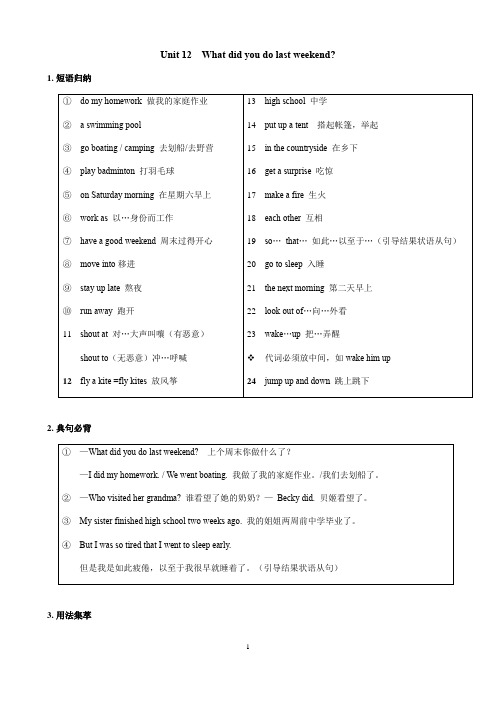
Unit 12 What did you do last weekend?1.短语归纳2.典句必背3.用法集萃(1)What did you do last weekend? 你上周末做了什么?❖last 作形容词时,意为“最后的,最末的”或者“紧接前面的,刚过去的”。
例如:Today is the last day in the year. 今天是今年的最后一天。
I didn’t sleep well last night. 昨晚我没睡好。
❖last作副词时,意为“最后地”,例如:I’m the last one. 我是最后一个。
❖last 做动词时,意思是“持续,继续,维持”等,例如:The hot weather lasted a week. 炎热的天气持续了一周。
(2)How interesting! 多有趣啊!❖本句是how引导的感叹句,how用来修饰形容词或副词,此类感叹句的结构为:“How+形容词/副词( +主语+谓语)!”。
例:How beautiful the girl is! 这个女孩真漂亮啊!How fast the boy is running ! 那个男孩跑得真快啊!❖what也可以引导感叹句,what用来修饰名词。
常见的结构有:(3)I stayed up late to watch the soccer game. 我熬夜到很晚看了足球赛。
❖stay up是固定搭配,意为“熬夜”。
例:She stayed up until 2 :00 am. 她熬夜熬到凌晨两点。
❖常见的“动词+up”结构的短语还有:(4)The cat quickly ran away. 那只猫飞快地逃跑了。
❖run away意为“逃跑;跑开”,其中run意为“跑”,过去式是ran,属于不规则变化。
例:The thief tried to run away, but he failed. 那个小偷试图逃跑,但失败了。
人教版七年级英语下册Unit12SectionA单元语法聚焦十二

单元语法聚焦十二
3. He found the key in his drawer.(对画线部分提问) ___W__he_r_e_ ____d_id___ he ___f_in_d___ the key? 4. She did her homework at school.(改为否定句) She ___d_i_d_n_'t_ ____d_o___ her homework at school. 5. They visited other countries during the holiday.(改为一般疑问句) ____D_i_d__ they ___v_is_it___ other countries during the holiday?
单元语法聚焦十二
( B )5.2016·绵阳—Don't you see the sign “No parking!” on the right? —Sorry, I ________. But now I know parking here is not right. A.don't B.didn't C.hadn't D.doesn't
单元语法聚焦十二
(3)一般疑问句:___D_id____+主语+__动_词__原__形_+其他?肯定回答: Yes, __主_语_____+___d_i_d___.否定回答:No, __主__语____+__d_id_n_'_t __. —Did he go to Guangzhou yesterday? 昨天他去广州了吗? —Yes, he did./No, he didn't.是的,他去了。/不,他没去。 (4)特殊疑问句:特__殊__疑_问__词_+___d_i_d___+主语+_动__词_原__形__+其他? What time did he get to school this morning? 今天上午他是什么时间到学校的?
最全面人教版七年级下册英语第十二单元知识点归纳总结
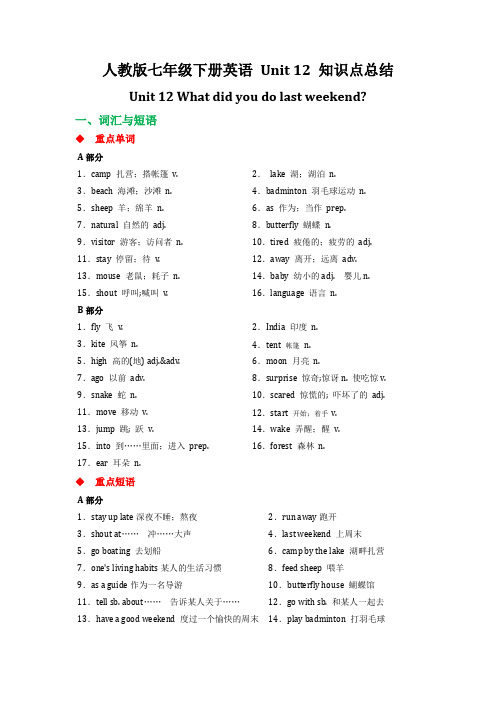
人教版七年级下册英语Unit 12 知识点总结Unit 12 What did you do last weekend? 一、词汇与短语◆重点单词A部分1.camp 扎营;搭帐篷v.2.lake 湖;湖泊n.3.beach 海滩;沙滩n.4.badminton 羽毛球运动n. 5.sheep 羊;绵羊n.6.as 作为;当作prep. 7.natural 自然的adj.8.butterfly 蝴蝶n.9.visitor 游客;访问者n.10.tired 疲倦的;疲劳的adj. 11.stay 停留;待v.12.away 离开;远离adv. 13.mouse 老鼠;耗子n.14.baby 幼小的adj. 婴儿n. 15.shout 呼叫;喊叫v.16.language 语言n.B部分1.fly 飞v.2.India 印度n.3.kite 风筝n.4.tent 帐篷n.5.high 高的(地) adj.&adv.6.moon 月亮n.7.ago 以前adv.8.surprise 惊奇;惊讶n. 使吃惊v. 9.snake 蛇n.10.scared 惊慌的; 吓坏了的adj. 11.move 移动v.12.start 开始;着手v.13.jump 跳; 跃v.14.wake 弄醒;醒v.15.into 到……里面;进入prep.16.forest 森林n.17.ear 耳朵n.◆重点短语A部分1.stay up late深夜不睡;熬夜2.run away跑开3.shout at……冲……大声4.last weekend 上周末5.go boating 去划船6.camp by the lake 湖畔扎营7.one's living habits某人的生活习惯8.feed sheep 喂羊9.as a guide作为一名导游10.butterfly house 蝴蝶馆11.tell sb. about……告诉某人关于……12.go with sb. 和某人一起去13.have a good weekend 度过一个愉快的周末14.play badminton 打羽毛球B部分1.fly a kite 放风筝2.high school 中学3.put up 搭起;举起4.each other 互相;彼此5.get a surprise 吃惊6.shout to……对……大声喊叫7.up and down 上上下下;起伏8.wake……up 把……弄醒9.a special gift 一件特殊的礼物10.take a long bus ride to 乘长途车去11.put up 搭起;举起12.keep sb. warm 使某人暖和13.on the first night 在第一个夜晚14.tell a story 讲故事15.go to sleep 入睡,睡着16.look out of 朝外看17.read a book about…读关于…的书18.know about 知道关于19.start to do sth. 开始做某事20.jump up and down 跳上跳下21.move into 搬进22.make a fire 生火23.something interesting 有趣的事情24.feel……doing sth. 觉得……正在做某事25.finish high school 高中毕业26.see……doing sth. 看见……正在做某事27.clean one's room 打扫房间28.so……that……如此……以至于……29.on Saturday night 在周六晚上30.have dinner with sb.和某人一起吃晚饭31.stay at home 待在家里32.have a busy weekend度过一个繁忙的周末33.talk show 脱口秀34.study for……为……学习◆重点句子A部分1.—What did you do last weekend? 上个周末你做什么了?—I did my homework. 我做我的家庭作业了。
Unit12重点知识讲解人教版英语七年级下册

七下Unit 12一、短语1.move into the forest 进入森林2.feel things moving 感觉东西在动3.learn a very useful lesson学到一个有用的教训4.have a busy weekend 有一个忙碌的周末5.read a book 看书6.see an interesting talk show看一个有趣的谈话节目7.in the countryside 在乡下8.at the National History Museum在自然历史博物馆9.over 200 kinds of butterflies 200多种蝴蝶10.their living habits 它们的生活习惯11.lose things 丢东西二、句型1. 我对科学一点都不感兴趣。
I am not interested in science at all.2. 这个男孩多有趣啊!How interesting the boy is!= What an interesting boy he is!3. 上个周末你做了什么?What did you do last weekend?4. 我当了向导。
I worked as a guide.5. 你周末过得好吗?Did you have a good weekend?三、重点知识讲解1.as的用法及与like的区别as作__词,意为“_________________ ”,其后常接表示称呼或职业的名词,内含“实际上是……”之意。
like作_____________ 词,意为“_____________ ”,内含“实际上不是……”之意。
2.感叹句How interesting!是_____________ 句,表达说话时一种较强烈的感情,如喜悦、惊叹等。
how 如果修饰形容词(形容词作表语),则句中的谓语动词用____________动词。
人教版七年级下册英语Unit12单元语法知识点总结

人教版七年级下册英语Unit12单元语法知识点总结本单元重点短语的具体用法1. Last weekend:用于描述过去的时间,通常在句子中作时间状语。
例如:I went shopping last weekend.(我上周末去购物了。
)2. Do one's homework:表示做作业。
例如:I need to do my homework before going out.(我需要在出去之前做作业。
)3. Go to the cinema:去看电影。
例如:They decided to go to the cinema instead of staying at home.(他们决定去电影院而不是待在家里。
)4. Go boating:去划船。
例如:We went boating on the lake and had a great time.(我们在湖上划船,玩得很开心。
)5. Camp by the lake:在湖边露营。
例如:They camped by the lake and enjoyed the beautiful scenery.(他们在湖边露营,欣赏美丽的风景。
)6. Go to the beach:去海滩。
例如:I like to go to the beach to relax.(我喜欢去海滩放松。
)7. Play badminton:打羽毛球。
例如:They played badminton in the park.(他们在公园里打羽毛球。
)8. On Saturday morning:在周六的早上。
例如:On Saturday morning, I usually sleep in.(在周六的早上,我通常会睡懒觉。
)9. Study for the English test:为英语考试学习。
例如:I have to study for the English test tomorrow.(我必须为明天的英语考试学习。
七年级下册Unit 12 人教版英语中考一轮复习(词汇+语法讲解)

一轮复习:七下U12 词汇+语法讲解【单词默写】【单词变形】【单词变性】natural形容词变名词____________ scared形容词变动词____________ high形容词变名词____________ india名词变形容词____________visitor名词变动词____________move动词变形容词____________surprise动词变形容词____________【一词多义】1. as ____________ ______________ ___________ __________ ________________ As a student, study plays an important part.You should come here as soon as possible.As China develops, our life becomes better and better.As I came here, I met a friend of mine.I like many fruits such as apples, pears and so on.2. move __________ ___________ ______________We will move to a new house next week.The movie moved us very much.Could you move that box away?3. stay ___________ ___________ __________I will stay in a hotel when I travel to a new place.You should stay where you were.He keeps exercising every day, so he stays healthy.4. surprise _______________ _____________It’s a big surprise that he passed the exam.His behavior surprises me very much.【词汇用法】1. tired: adj./be tired/be tired of2. shout: v./shout to/shout at3. start: v./start to do/start doing/to start with/start out4. wake: v./wake sb. up/wake up【攻占语法】复习情态动词(can/could/would), 句型(祈使句/there be),副词(频度副词),形容词(原级),时态(一般现在时/现在进行时/一般现在时与现在进行时区别/一般过去时),介词(方式介词)【词汇练习】1.She works a ________ a nurse in that hospital.2.The e-book readers make it possible for students to throw a ________ heavy school bags.3.Let’s go c ________ on the beach tomorrow. My father got me a tent for my birthday.4.In parents’ eyes, teenagers are not expected to get their e ________ pierced. It looks awful.5.The boy, with his brother, f _______ the birdlike kite high in the sky last Sunday.6.The new term is coming. How time f ________!7.The h ________ you climb the mountain, the more beautiful view you will see.8.The government spoke h ________ of him for his courage and encouraged the public to learn from him.9.Please turn the direct speech i ________ the indirect speech.10.I was really scared when I saw a monkey j ________ towards me.11.Lucy has a gift in learning l________. She can speak both English and French.12.There were several m ________ in the house. So he decided to keep a cat.13.Today is Mid-autumn festival. Look! The m ________ is so bright and beautiful!14.Snakes don’t have ears, so they can’t hear but can feel things m ________.15.For her, books were as n ________ to life as bread.16.He saw an old man lying on the side of the road, s ________ for help.17.S ________ are a kind of animal that have no legs but can move quickly.18.Before the Spring Festival, it’s a tradition for Chinese people to clean their house and they hope to s ________away the bad luck.19.To his s ________, he successfully passed TOEFL (test of English as a foreign language).20.John felt really t ________ after working in the field for more than ten hours.21.I worked from early morning till late at night. It has been a long and t ________ day. Now I really need to go tobed.22.As the owners of the Hangzhou, we warmly welcome all the v ________ from the world.23.Sleeping Beauty has just w ________ from deep sleep. Everyone feels happy for her.24.My mother w ________ me up ato'clock yesterday morning and told me it was time to get up.25.The baby was w ________ by the loud noise outside.【语法练习】Henry likes music best of all the subjects and he dreams of being a singer. But because 1 ________ his poor family, he dropped out of school(辍学) two years ago and now he works on a farm. Although his pay isn’t high, he spends much money on CDs and music show 2 ________(ticket).One day there was a music show in the park. 3 ________ Henry went there, all the tickets were sold out. He saw a pole(杆子) outside the park and then climbed up the pole to watch the show. Three minutes later, a man came and said 4 ________(serious), “It’s dangerous up there! Come down!”“Wait 5 ________ minute, please!” Henry said. Then that man 6 ________(hear) someone playing the piano beautifully. He asked, “Who is the 7 ________(perform)?”“Bob!”“Wonderful! He’s my friend.”“What does he do? Is he a zookeeper?” asked Henry.“No, he’s a reporter. What 8 ________(make) you so happy?”“Oh, he is playing the piano with a dog,” Henry said.“That dog is pretty smart. In fact, it’s the 9 ________(smart) dog that I’ve seen,” said the man.“What other things can it do?” asked Henry.“It can dance when Bob sings English songs.” said the man.“Ah? ” Henry couldn’t believe his ears. “Wow, it’s so great. Look, it is enjoying 10 ________(it).What’s the most important thing for athletes to win? Training hard? Having an excellent coach? Never giving up? Probably these are all very important, but according to a new book, the most important thing is getting enough sleep.This book is Sleep to Win! 1 ________(write) by Dr. James Maas and Haley Davis. In this book, you can find out how getting more sleep helped fifteen-year-old Sarah Hughes win 2 ________ Olympic gold medal. She said 3 ________ the biggest change she made in her training for the Olympics was getting more sleep. Sleep to Win! also gives examples of other professional athletes as well as student athletes becoming faster runners because 4 ________ getting more sleep. For example, after Amber Way, a high school student in Michigan, changed her sleeping time from seven to over nine hours each night, her running speed 5 ________(increase) a lot. She finally became the state champion after 6 ________(break) five school records.Dr. Haley Davis explained, “Why is sleeping so helpful? The reason is that teenagers whose bodies are still growing need 7 ________(get) about 9.25 hours of sleep each night. That’s about two hours more than most American teenagers are getting. Enough sleep helps the brain work 8________(proper). While teenagers are sleeping, 9 ________(they) brains are preparing for the next day. A good 10 ________(night) sleep can help them make decisions, be creative and active.”Can you sing or dance? Do you ride a unicycle(独轮车)? Do magic tricks? Drink a glass of milk in ten seconds? Recite 1 ________(poem) from memory? Well, you’ve got talent, my friend! And what 2 ________(good) time to show it off than at the school talent show!Middle school talent shows in the us happen every year. Whatever you’ re good at, have five minutes 3 ________(show) the world. It’s early in the school year and kids can become little celebrities(明星). The shy boy who spends his evenings 4 ________(practice) Spanish guitar will surprise his classmates with beautiful music. The sporty girl on the soccer team will wow(使惊叹) the crowd 5 ________ her sweet singing voice. Everyone 6 ________(have) a chance to shine.Almost anyone doing almost anything 7 ________ (allow) into a talent show. As long as your isn’t rude 8 ________illegal(不合法的), it’s a “go”.On the day of the show, all the students sit in the school gymnasium, ready to cheer for the many skills of their classmates.Many of today’s stars 9 ________(start) their careers in school talent shows---Madonna, Britney Spears and Justin Timberlake all showed their skills early in life. 10 ________ you’re not Justin Bieber, you can become a star in your own right at your middle school talent show.When September is coming, it means it’s time to go back to school! For Chinese students, most school starts 1 ________ the same day. Except for the first-year students, most of you know you will share summer 2 ________(story) with the same classmates from last year. But in US schools, students are getting ready for classes 3 ________(different).First of all, US schools don’t all start on the same day. 4 ________(class) begin at any time between August and September. Every school 5 ________(decide) when their class will begin. If summers are hot, then school will usually start a little 6 ________(late).Every year Chinese students usually see the same teachers and classmates, 7 ________ US students have some big changes(变化).In American high schools, teachers divide subjects into different levels(等级). Students can choose their favourite teachers and courses according to their abilities(能力) and interests. This means that every year students will go to different 8 ________(classroom) for each class. They will meet new classmates and teachers in each one.________ the first year students, the first day of school also means they finally get their own lockers(储物柜). Primary school students in the US have to share lockers with their classmates. But once students make it to junior high, they finally get their own. Then they will have a place 10 ________(put) bags and coats.【参考答案】natural形容词变名词nature scared形容词变动词scare high形容词变名词height India名词变形容词Indian visitor名词变动词visit move动词变形容词moving surprise动词变形容词surprising1. as 作为与... 一样随着当…时候举例As a student, study plays an important part.You should come here as soon as possible.As China develops, our life becomes better and better.As I came here, I met a friend of mine.I like many fruits such as apples, pears and so on.2. move 搬家使…感动搬We will move to a new house next week.The movie moved us very much.Could you move that box away?3. stay 待在待着保持I will stay in a hotel when I travel to a new place.You should stay where you were.He keeps exercising every day, so he stays healthy.4. surprise 惊喜使…吃惊It’s a big surprise that he passed the exam.His behavior surprises me very much.【词汇练习】as away camping ears flew flies higher hightly into jumping language mice moon moving nature shouting snakes stay surprise tired tiring visitors woken woke woken【语法练习】of tickets When seriously a heard performer makes smartest itself written an that of increased breaking to get properly their night’s poems better to show practicing in has is allowed or started Although on stories differently Classes decides later but classrooms for to put。
人教版英语七年级下Unit12课本知识梳理及课后习题
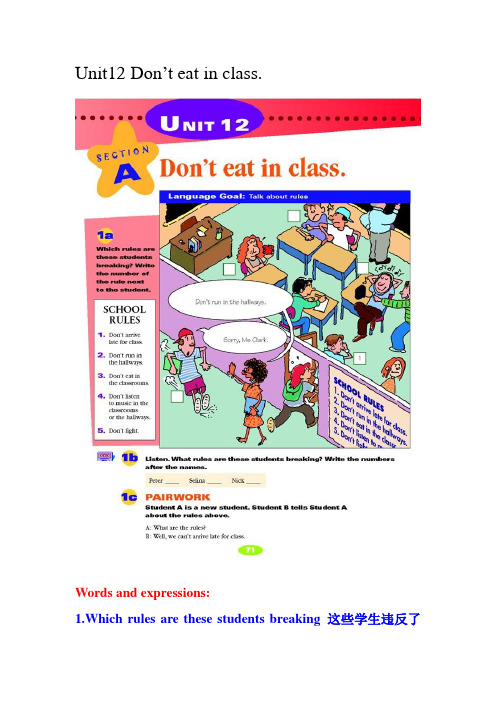
Unit12 Don’t eat in class.Words and expressions:1.Which rules are these students breaking 这些学生违反了哪些规定?①这是由疑问词which 引导的特殊疑问句。
Which 在本句中是疑问形容词,它还可以作疑问代词,“哪个,哪些”Which do you like better, classical music or popular musicWhich sport is your favoriteWhich 用作疑问代词时可以独立使用,用作疑问形容词后面须接名词,两种情况经过变化后可以互换使用。
Which hat is your sister’s=Which is your sister’s hat②rule 在句中作名词,“规则,规定”We must obey school rules.常见的词组:obey a rule 遵守规定break a rule 违反规定carry out a rule 执行规定abolish a rule 废除规定③break 是动词,“破坏,违反”,还可以表示“破坏,打破,打碎”。
The boy often breaks school rules.Who broke the window of the classroomBreak 作名词,“休息,中间,中断”。
Let’s take a ten-minute break.2.Don’t arrive late for class.①本句是一个祈使句的否定句。
祈使句是指动词原形开头,表达命令或者乞求的句子。
其否定句是在句首加“Don’t”构成.Don’t listen to mu sic in class.Don’t play basketball in the classroom.Don’t run in the hallways.②区分arrive,get和which.句中的arrive 表示“到达,抵达”,为不及物动词,后面加宾语需加介词at 或in。
Unit 12 单元知识点总结 七年级英语下册(人教版)
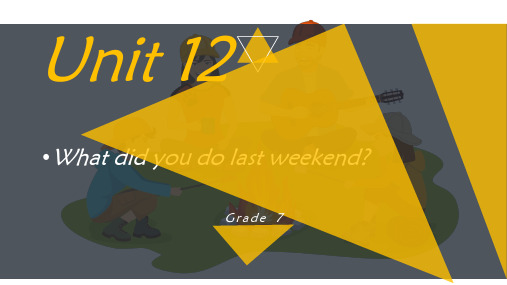
3.当我看到考试分数时,我吃了一惊。
I __g_o_t____a___s_u_r_p_r_is_e_______ when I saw the grades of the exams.
4.你能教我怎样搭这个帐篷吗?
Can you teach me ____h_o_w____to____p_u_t____u_p___ the tent?
C.How nice a
D.What nice a
4.__________money we have! We can’t even afford a piece of bread.
A.What little
B.How little
C.What a little
5.__________good book! It’s so helpful to us.
02
词汇专题
natural, tired, surprising…
2.1 sheep
“绵羊” 可数名词 (单复同形)
I bought a sheep just now. So I have five sheep now.
2.2 natural
natural
adj. 自然的
Our city has a good natural environment.
run away 抛开,逃跑 She gave me a book and ran away quickly.
That’s why… 那是为什么…
That’s why I come here.
a second language 第二语言
English is often used as a second language.
新目标人教版英语七下unit12知识点总结

Unit 12二、短语1 go boating/camping去划船/去野营2 play badminton打羽毛球3 work as以……身份而工作4 have a good weekend周末过得愉快5 kind of有点儿6 stay up late深夜不睡;熬夜7 run away跑开8 fiy a kite放风筝9 high school中学10 put up搭起;举起;张贴;建造常考put 短语put on 穿上put away 收拾;储存;放弃put out 伸出put off 拖延11 in the countryside在乡下12 make a fire生火13 each other互相14 get a surprise 吃惊15 so...that...如此……以至于…16 go to sleep入睡17 the next morning第二天早上18 look out of...向……外看---反义:look into 向里看19 shout to...对……大声喊叫(多指距离远)shout at...冲……大声叫嚷(多指不礼貌)20 up and down上上下下;起伏21 wake...up把……弄醒22 move into...移进……23 be afraid of / be scared of 害怕24 tell sb. about sth.意为“告诉某人关于某事”三知识点1. What did you do last weekend?当表时间的名词前有last, next, this, that, every等修饰词时,名词前不再用介词2 I studied for the test. test 小考、测验多用于指规模小的考试exam 指正式的、规模较大的考试quiz 测验指无需事先准备、随时进行的检测3 How interesting!How + adv/adj + 主(真)+ 谓!How beautiful the house is!What +名/名短+ 主(代)+谓!What a beautiful house it is!4 I was so scared(that)I couldn’t move.so…that结构,如此,以致于主+谓+so+adj/adv+that从句。
人教版英语七年级下册unit 12 语法及练习附参考答案

人教版英语七年级下册unit 12 语法及练习附参考答案1. How interesting!这是一个感叹句,感叹句是用来表达喜怒哀乐等强烈情感的句子。
感叹句一般用how或者what开头,句末加感叹号。
what 修饰名词,how修饰形容词或副词。
具体句式如下:(1)what引导的感叹句:1)What a(an)+形容词+可数名词的单数形式+主语+谓语!What a clever boy he is!多么聪明的小男孩啊!2)What+形容词+可数名词的复数形式+主语+谓语!What interesting books the children are reading!孩子们读的书多么有趣啊!3)What+形容词+不可数名词+主语+谓语!What cold weather it is!多冷的天!(2)how引导的感叹句:1)How+形容词或副词+主语+谓语!How lovely the baby is!这孩子真可爱!(lovely 为形容词)How fast he runs! 他跑地多快啊!(fast为副词)2) How+形容词+a(an)+可数名词的单数形式+主语+谓语!How heavy a box they are carrying! 他们抬的箱子多重啊!3)How+主语+谓语!How time flies! 时间过得多快!2. -Who visited her grandma?-Becky did.本句的答语中的did是用来代替上文中的动词visited的。
英语中为了避免不必要的重复,经常用do, does, did, so等来代替前面的动词或相关内容。
例如:-Do you like music? 你喜欢音乐吗?-No, but my father does. (does= likes music)不,但是我父亲喜欢音乐。
-Do you think he is clever? 你认为他聪明吗?-I think so.(so 代替he is clever)我认为如此。
人教初一(下)英语unit12语法篇

unit 12____________________________________________________________________________________________________________________________________________________________感叹句, 选择疑问句的理解及应用感叹句是用来表达人的特殊情感的句子,可以表达人的喜、怒、哀、乐等感情色彩。
感叹句可以是一个单词、一个不定式短语、一个由短语构成的独立句,也可以是由what\how引导的句子,句末常用“!”。
1.what引导的感叹句(1)What+a\an+形容词+可数名词的单数形式+主语+谓语!What a beautiful girl she is!(2)What+形容词+可数名词的复数形式+主语+谓语!What important jobs they have done!(3)What+形容词+不可数名词+主语+谓语!What sweet water it is!2.how引导的感叹句(1)How+形容词或副词+主语+谓语!How interesting the dog is!(2)How+形容词+a\an+可数名词单数形式+主语+谓语!How useful a subject it is!(3)How+主语+谓语!How time flies!3.一些特殊形式的感叹句(1)在陈述句、祈使句或疑问句句尾加感叹号变为感叹句,表示某种强烈的感情。
He runs so fast!(2)用一个词或词组表达强烈感情的句子也是感叹句Wonderful!(3)以there,here等副词开头的感叹句。
There he is!选择疑问句提出两种或两种以上的情况,要求对方选择一种情况回答的问句叫选择疑问句。
选择疑问句中的两种或两种以上的情况用or连接,回答时不能使用yes或no,而要用一个完整的句子或其省略形式。
七年级英语下册 语法重点复习整理unit 12 人教新目标版

Unit 12祈使句;校规;标志语;动词短语;• school rules• break the rules / obey the rules• wear hats = wear a hat•Don’t arrive late f or class.•Don’t run in the hallways.•Don’t eat in the classroom s.•Don’t listen to music in the classrooms or the hallwa ys. •Don’t fi ght with others.•Don’t go out on s chool nights.• Do your homework after school.• What are the rules at your school?•Can we do…?Yes, we can. / No, we can’t.Can you wear hats in school?Do you have to wear a uniform at school? What else do you have to do?after class / schoolin classin the classroom• have to wear sports shoes for gym class • have to clean the classroom every day • have to wear a uniform• practice the / your guitar• a s et of rules• make your own rules• I c an’t go out.I can’t, either.• every weekend• I have too many rules in my house. • too many rules• too much food / much too dear• every morning• meet my friends after school• on school nights•have to be in bed by ten o’clock• on weekends• wash my clothes / clean my room• help my mom make dinner• later•go to the Children’s Palace to learn the piano •I never have any fun.• have to be in bed• have to go to bedNo + 动词ing /名词.(不准做…)•No smoking! = Don’t smoke.•No talking! = Don’t talk. = Keep quiet.• No food or drinks.= Don’t take any food or drinks here.•No wet umbrellas.• No listening to music.• No schoolbags.• sports shoes / sports news / sports meeting / sports club • family rules•Don’t talk loudly at home.•walk to …•ride a bike to …•drive (a car) to …• take a b us/train/plane to…• go to the park on foot• go to school by bus / car / train / bike /plane•That’s right.• too strict• They are very healthy.• went to Shanghai with my family• went on a three-day school trip。
人教新目标版初中英语七年级下册第12单元复习Unit 12 单元语法聚焦
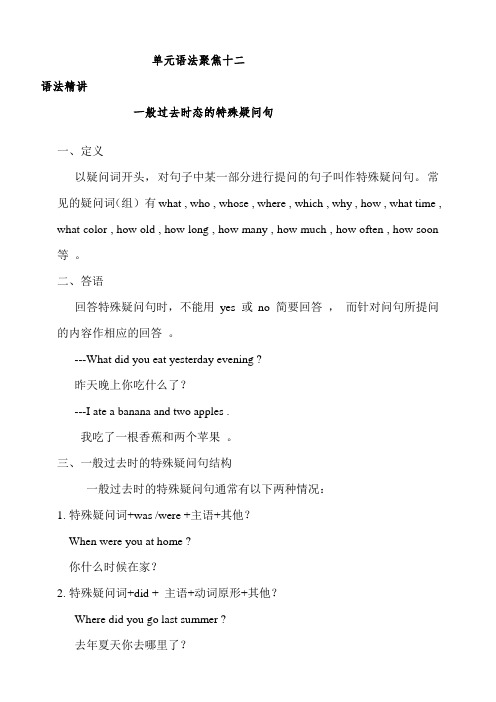
单元语法聚焦十二语法精讲一般过去时态的特殊疑问句一、定义以疑问词开头,对句子中某一部分进行提问的句子叫作特殊疑问句。
常见的疑问词(组)有what , who , whose , where , which , why , how , what time , what color , how old , how long , how many , how much , how often , how soon 等。
二、答语回答特殊疑问句时,不能用yes 或no 简要回答,而针对问句所提问的内容作相应的回答。
---What did you eat yesterday evening ?昨天晚上你吃什么了?---I ate a banana and two apples .我吃了一根香蕉和两个苹果。
三、一般过去时的特殊疑问句结构一般过去时的特殊疑问句通常有以下两种情况:1.特殊疑问词+was /were +主语+其他?When were you at home ?你什么时候在家?2.特殊疑问词+did + 主语+动词原形+其他?Where did you go last summer ?去年夏天你去哪里了?语法精炼I 对画线部分提问1.They took some great photos in the park last Sunday ._______ _____ they _______ in the park last Sunday ?2.I went to the supermarket with my mother this afternoon ._______ _______ you _____ with your mother this afternoon ?3.Mike lost his key last Saturday .________ ______ Mike ______ his key ?4.Ann was late for work this morning .________ _____ late for work this morning ?5.They didn’t like the movie because it was boring ._______ _______ they _____ the movie ?6.Their school trip was very relaxing .______ ______ their school trip ?II. 用适当的动词或括号内所给单词的适当形式填空1. ---Did you _____(have ) a good weekend ?---Yes. I ______ . I _______(have ) a nice weekend . I _____(go) to the movies .3.---What ____he _____ (do ) yesterday evening ?---He ______(study) for the English test .3 --Did you ______(have ) noodles for breakfast yesterday ?-- No, I ______. I _____(get ) up late . I just ______(drink ) a cup of coffee . But I _____(eat ) a lot for lunch .4 --- I _____(go) to the movies last weekend . How about you ?---I ______(not do ) my homework . I ______(visit) my grandma.5 ---What did you do yesterday ?---We _____(play) basketball on the playground . We ______(be ) very happy .7.Where ______Mr. Green usually ______ (do) some reading last year ?III. 根据短文内容,从方框中选择恰当的单词并用其适当形式填空,有两词多余。
七年级英语下Unit_12_知识点归纳与复习人教新目标版

新目标七年级下Unit 12 知识点归纳与复习单元知识清单一、重点单词:1. r _ le 规则2. cl _ ssr _ _ m 教室3. fi _ _ t 打架;争吵4. _s 女士5. _ _ ts _ de 外面的6. h _ _ _ 大厅;礼堂7. _ _se 其他的;别的8. b _ 到(某时)之前;不迟于9. w _ sh 洗;洗涤10. l _ _ dly 大声地二、必会短语:1. ________ to 不得不2. ________ shoes 运动鞋3. ________ Palace 少年宫4. no ________ 不许讲话5. ________ late ________ class 上课迟到6. ________ the hallways 在走廊里7. ________ music 听音乐8. ________ hall 餐厅9. ________ a hat 戴帽子10. eat________ 在外面吃11. ________a uniform 穿制服12. help sb. ________ sth. 帮助某人做某事13. ________class 体操课14. go ________ 外出;出去15. ________ school nights 在上学日的晚上16. ________ school 放学后17. ________ rules 太多的规则18. be ________ bed 上床睡觉19. ________ ten o’clock 到十点为止20. ________ weekends 在周末时21. ________ dinner 做饭三、应知语法和句式:1. 祈使句为让语气更加缓和和客气,常在句首加上________。
2. 祈使句的肯定句:行为动词+其他成分如:像这样带着它跑。
________ ________ ________ like this.Be+表语如:请小心。
新目标英语七年级(下)12单元讲解

新目标英语七年级(下)12单元讲解新目标英语七年级(下)Unit 1重点归纳与基础知识一体化练习一、单元要点归纳1、can的用法can为情态动词,没有人称和数的变化,只需在can后加上动词原形即可,构成can /can’t +V.原形。
2、选择疑问句由or连接的两个选择项,不能用Yes或No来回答。
—Can you play the piano or the violin?—I can play the piano.—(或者:I can play the violin.)3、play的词组①play +棋牌类/球类/运动/比赛(游戏), 不用冠词。
②play和乐器连用, 一定要记住中间少不了定冠词―the‖。
play the drums4. want sth. 想要做某事5. and和or连接两个并列结构,or通常用于否定句,and用于肯定句。
I can play the guitar and the drum.I don’t like playing basketball or soccer.6. speak, talk, tell的搭配运用①speak+某种语言②talk 和to, with连用 talk to / with③tell sb. sth. 告诉某人某事 tell me a story tell stories7. be good at 和be good with①be good at=do well in 擅长于…., 在….上做得好,at为介词,后跟ing。
You are very good at ②be good with 与…相处得好;善待….; 对…有办法Mr Li is a good teacher. He is good with the boys and girls in his class.8. 其他几个要记忆的词组 old people’s home二、句型1.熟练的谈论表示能力的话题,以及自己的意愿。
春人教新目标英语七年级下册Unit12知识点总结
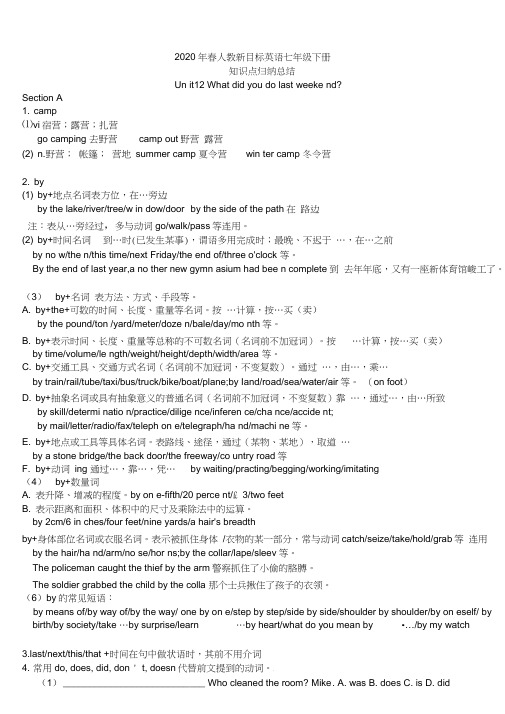
2020年春人教新目标英语七年级下册知识点归纳总结Un it12 What did you do last weeke nd?Section A1. camp⑴vi宿营;露营;扎营go camping 去野营camp out野营露营(2) n.野营;帐篷;营地summer camp 夏令营win ter camp 冬令营2. by(1) by+地点名词表方位,在…旁边by the lake/river/tree/w in dow/door by the side of the path在路边注:表从…旁经过,多与动词go/walk/pass等连用。
(2) by+时间名词到…时(已发生某事),谓语多用完成时;最晚、不迟于…,在…之前by no w/the n/this time/next Friday/the end of/three o'clock 等。
By the end of last year,a no ther new gymn asium had bee n complete到去年年底,又有一座新体育馆峻工了。
(3)by+名词表方法、方式、手段等。
A. by+the+可数的时间、长度、重量等名词。
按…计算,按…买(卖)by the pound/ton /yard/meter/doze n/bale/day/mo nth等。
B. by+表示时间、长度、重量等总称的不可数名词(名词前不加冠词)。
按…计算,按…买(卖)by time/volume/le ngth/weight/height/depth/width/area 等。
C. by+交通工具、交通方式名词(名词前不加冠词,不变复数)。
通过…,由…,乘…by train/rail/tube/taxi/bus/truck/bike/boat/plane;by Iand/road/sea/water/air等。
(on foot)D. by+抽象名词或具有抽象意义的普通名词(名词前不加冠词,不变复数)靠…,通过…,由…所致by skill/determi natio n/practice/dilige nce/inferen ce/cha nce/accide nt;by mail/letter/radio/fax/teleph on e/telegraph/ha nd/machi ne等。
- 1、下载文档前请自行甄别文档内容的完整性,平台不提供额外的编辑、内容补充、找答案等附加服务。
- 2、"仅部分预览"的文档,不可在线预览部分如存在完整性等问题,可反馈申请退款(可完整预览的文档不适用该条件!)。
- 3、如文档侵犯您的权益,请联系客服反馈,我们会尽快为您处理(人工客服工作时间:9:00-18:30)。
12 What did you do last weekend?小知识:on Saturday morning/afternoon/evening/night 介词短语,意思为“在周六上午/下午/晚上/深夜”。
(常做时间状语。
用法:置于句首则逗号隔开,置于句末则直接使用)补充:其他结构相同的表述What did you lose?I lost my keys.What did they play?They played ping-pong.What did she like?She liked her pen.基本句型2Who went to the beach?回答一:Carol went to the beach.回答二:Carol did.Who camped by the lake?回答一:Lucy camped by the lake.回答二:Lucy did.Who played badminton?回答一:I played badminton.回答二:I did.思考1:请分析句子结构。
思考2:这些句子是怎么来的?(即:这些句子的实质是什么?)基本句型3Where did you go?I went to the cinema.Where did Carol go?He went to the beach.Where did they go?They went to a farm.思考:请分析句子结构。
基本句型4(情境:Sarah上周末去了动物园)Who did she go with?回答一:She went to the zoo with her classmates. 回答二:She went there with her classmates.回答三:She went with her classmates.(情境:John上周末去了沙滩)Who did he go with?回答一:He went to the beach with me.回答二:He went there with me.回答三:He went with me.补充:其他结构相同的表述(情境:主人公上周和他爸爸打了羽毛球)Who did you play with? 你和谁一起玩?回答一:I played badminton with my father.回答二:I played it with my father.回答三:I played with my father.重要的动词搭配SAdo (one’s) homework 做(某人的)作业。
(do—did)go to the cinema 去电影院/去看电影(go—went)go boating 去划船camp by the lake 在湖边露营(camp—camped)小知识:camp vi. 宿营,露营。
常见搭配:go camping 去野营go to the beach 去沙滩play badminton 打羽毛球(play—played)study for the English test 为英语考试学习(study—studied)常见用法:study for sb./sth. 为某人/某事/某物而学习。
e.g. I always study for my mom.e.g. I study for my dream. 我为梦想而学习。
知识点大全2dHow was your weekend? 你周末过得怎么样?分析:即便weekend这个词本身没有包含过去的含义,但句子中用的was,因此我们也知道提问的人想问的是过去的某个周末。
I worked as a guide at the National History Museum.我在自然历史博物馆作导游。
小知识:the National History Museum 自然历史博物馆。
小知识:as prep. 作为•••,以•••的身份常见搭配:work as a guide (at/in sp.) (在某地)作导游。
(说明:in+大地点,at+小地点)e.g. I want to work as a guide. 我想要做导游。
e.g. Jack worked as a guide at the science museum.e.g. John often works as a guide in Wuhan over his winter holidays. 约翰总是在寒假期间在武汉作导游。
类似表述:work as a doctor/teacher/worker/cleaner (in/at sp.) 在某地作医生/老师/工人/清洁工。
e.g. My father works as a doctor in a hospital.e.g. I worked as a teacher in a middle school.e.g. John worked as a worker in a factory.e.g. Lucy and John work as cleaners at a small park.How interesting! 多么有趣啊!说明:这是个省略一定成分后的感叹句。
(完整的感叹句知识以及感叹句中可以省略什么成分在八年级上学期介绍)以前见过“what”型的感叹句。
如“What a nice picture.”而例句中的为“how”型感叹句。
结构:How + 形容词! 意思是“多么……!”e.g. Look at that bird. How beautiful! 瞧那只鸟,多么漂亮呀!e.g. How strong! 多么强壮呀!They have a butterfly house with over 200 kinds of butterflies!它们拥有一个有着超过200多种蝴蝶的蝴蝶馆!小知识:butterfly n.蝴蝶(可数,复数为butterflies)复习:over prep. 超过•••e.g. There are over 200 people in the house. 房子里有超过200个人。
I told the visitors about them and their living habits.我告诉游客们关于蝴蝶以及他们的生活习性。
小知识:visitor n.游客,旅客。
(可数)小知识:living habit 生活习惯,生活习性。
常见搭配:a living habit, living habitse.g. Every animal has different living habits. 每种动物都有着不同的生活习性。
e.g. You need to have a good living habit. 你需要有一种好的生活习惯。
小知识:tell vt.讲,告诉。
(tell—told)补充tell的新用法:1)tell sb. about sth. 告诉某人关于某方面的事。
e.g. My father told me about his stories. 我的爸爸告诉我关于他的故事。
e.g. I don’t want to tell you about my secret. 我不想告诉你我的秘密。
Did you have a good weekend?意译:你周末过得开心吗?I am kind of tired now.我现在有点累了。
小知识:tired adj.劳累的,疲惫的,疲倦的。
e.g. I am tired. 我累了。
e.g. He feels tired. 我觉得累了。
e.g. A tired man is walking on the street. 一个疲惫的人正走在街上。
I stayed up late to watch the soccer game.我熬夜看了足球赛。
小知识:last night 昨晚。
(常做时间状语)补充:stay up 短语动词,意为“熬夜”。
常见用法:stay up to do (sth.) 熬夜做某事。
小知识:stay up late 短语动词,意思为“熬夜”。
e.g. Jack stayed up late last night, so he feels really tired now. 杰克昨晚熬夜了,所以他现在感到很累。
常见搭配:stay up late to do (sth.) 熬夜做某事。
e.g. I stayed up late to finish my homework. 我熬夜完成我的作业。
e.g. John said that he stayed up late to play computer games. 约翰说他熬夜玩了电脑游戏。
(说明:stay up与stay up late意思均为“熬夜”,只不过stay up late强调了其程度是“熬夜熬到挺晚的,而stay up没有刻意强调熬夜熬了多久,因此如果不在意这个细节时两者可以互换)其他类似表述:stay up all night 短语动词,意思为“整晚熬夜,熬夜一整晚”e.g. I stayed up all night. 我整晚熬夜了。
常见搭配:stay up all night to do (sth.) 整晚熬夜做某事。
e.g. I stayed up all night to do finish my homework.知识点大全3aWhen did he lose them? I heard it was yesterday.意译:他什么时候丢的?我听说是昨天(丢的)。
小知识:hear v.听到,听说。
(hear—heard)常见用法:1)hear sb./sth. 听到•••。
2)主语+ heard + 宾语从句。
意为“主语听说•••”。
e.g. —Who lost his keys?—I heard that John lost his keys.e.g. I heard what you did. 我听说了你做过的事。
e.g. I heard John would stay up late to do his homework. 我听说了约翰会熬夜做他的作业。
e.g. He heard where I lived. 他听说了我住在哪。
e.g. They heard how he got to school.e.g. I heard he would be a teacher.Baby mouse was afraid and climbed onto his father’s back. 老鼠宝宝很害怕,并且爬到了他爸爸背上。
